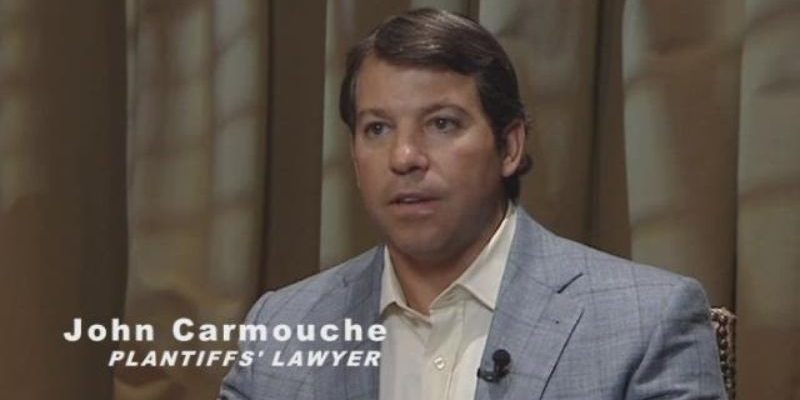The Wall Street Journal took a fairly determined poke at Louisiana’s governor Friday, on a subject we’ve been harping on for a long time – namely, that John Bel Edwards summoned a cabal of plaintiff attorneys to cook up lawsuits against oil companies blaming them for the loss of the state’s coastline.
The piece, by Allysia Finley of the paper’s editorial board, is behind WSJ’s paywall. But it’s almost worth a subscription in its own right. Here’s a taste…
Louisiana Gov. John Bel Edwards was elected in 2015 with substantial support from trial lawyers, and he’s now repaying them in kind. The former minority leader of the state’s House of Representatives is effectively extorting oil and gas companies to backfill the budget while engineering what could be a handsome payday for his friends at a politically connected law firm.
Mr. Edward s wasted no time shaking down Louisiana’s energy industry. Shortly after taking office in January 2016, he met with oil and gas companies and issued an ultimatum: Fork over billions of dollars to help restore Louisiana’s eroding coastline or brave a drawn-out legal battle.
“We are struggling to pay for our state’s Master Plan to restore the coast,” the governor wrote in a May 19 letter to the presidents of Louisiana’s two largest oil and gas trade associations, which between them represent more than 100 local companies. “I intend to be involved in all facets of the state’s coastal restoration efforts—including those efforts to secure funding for the Master Plan. . . . At this point, we have two choices—work together toward an amicable solution or spend years in litigation. There should be no doubt that it is in the best interests of Louisiana and the industry to choose the former option.”
Louisiana’s coastline loses a football field worth of land to erosion every 48 minutes. This would put many of Louisiana’s 20 coastal parishes without protective levees underwater by 2100. These areas have been incurring stronger storm surges as wetlands that once provided a protective barrier against approaching hurricanes have disappeared.
But as Mr. Edwards, a Democrat, has acknowledged, oil and gas exploration isn’t solely to blame for coastal erosion. Natural causes—such as changes in the course of the Mississippi River—have contributed. As did levying of the river by the U.S. Army Corps of Engineers. Dredging wetlands for fossil-fuel exploration played a secondary role.
The energy industry insisted that the governor initiate an administrative review to identify permit violations before taking legal action against individual companies. Since 1980, the state has issued about 60,000 coastal permits—many of which recognized the potential for adverse environmental effects.
The story goes into the fact that the state gave permits for the dredging of those canals by those oil companies, and in many cases it did so knowing there could be adverse environmental impacts from them. That makes the coastal lawsuits against the oil companies look rather bizarre now – they’re supposed to pay damages to the state for the state’s own negligence in giving out permits?
Finley notes that it’s Baton Rouge attorney John Carmouche, who’s spent the last few years buying elections in Louisiana and without a doubt played a role in buying Edwards’ election in 2015, who stands to gain perhaps more than anyone else…
Ganging up with local governments puts more pressure on oil and gas companies and increases the size of the potential jackpot, of which trial lawyers will get a cut. The law firm spearheading the coastal parish suits on a contingency basis happens to be Talbot, Carmouche & Marcello, which raised $2 million for a super PAC to boost Mr. Edwards in 2015 and spent heavily in local races.
The law firm also spent $10,500 to re-elect state district court judge Michael Clement, who will hear several cases in Plaquemines Parish that are set to go to trial in 2019—one year before the judge faces re-election. Such apparent political back-scratching isn’t a crime unless an explicit quid pro quo occurs, but all of this smells worse than rotten crawfish.
The coastal lawsuits are all in state courts after the first round, personified in the Southeast Louisiana Flood Protection Authority – East case, went nowhere in federal court. The question is whether Carmouche’s cash spread around in judicial elections nobody really pays much attention to makes for a different outcome in the Louisiana courts.
Advertisement
Legally it would be hard to imagine any damages oil and gas would be subject to paying here. But it’s never really been about that. It’s always been about trying to intimidate the oil and gas industry into coughing up a settlement. So far that looks like a major miscalculation on the part of Edwards and his cabal of plantiff lawyers – the oil industry’s reaction to those lawsuits has been fairly predictable and a worst-case scenario for the state. They’ve told Edwards “See you in court,” and they’ve proceeded to abandon any significant interest in drilling for oil in Louisiana while conducting a major economic revolution all over the rest of the country.
And meanwhile, Louisiana gets a black eye as a terrible place to do business because it’s run by crooked politicians and greedy trial lawyers.
There isn’t much light at the end of the tunnel, and won’t be until Edwards comes up for re-election in 2019.
Advertisement
Advertisement

